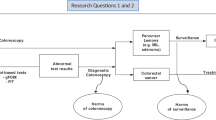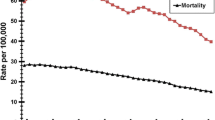Purpose
As evidence mounts for effectiveness, an increasing proportion of the United States population undergoes colorectal cancer screening. However, relatively little is known about rates of follow-up after abnormal results from initial screening tests. This study examines patterns of colorectal cancer screening and follow-up within the nation's largest integrated health care system: the Veterans Health Administration.
Methods
We obtained information about patients who received colorectal cancer screening in the Veterans Health Administration from an existing quality improvement program and from the Veterans Health Administration's electronic medical record. Linking these data, we analyzed receipt of screening and follow-up testing after a positive fecal occult blood test.
Results
A total of 39,870 patients met criteria for colorectal cancer screening; of these 61 percent were screened. Screening was more likely in patients aged 70 to 80 years than in those younger or older. Female gender (relative risk, 0.92; 95 percent confidence interval, 0.9–0.95), Black race (relative risk, 0.92; 95 percent confidence interval, 0.89–0.96), lower income, and infrequent primary care visits were associated with lower likelihood of screening. Of those patients with a positive fecal occult blood test (n = 313), 59 percent received a follow-up barium enema or colonoscopy. Patient-level factors did not predict receipt of a follow-up test.
Conclusions
The Veterans Health Administration rates for colorectal cancer screening are significantly higher than the national average. However, 41 percent of patients with positive fecal occult blood tests failed to receive follow-up testing. Efforts to measure the quality of colorectal cancer screening programs should focus on the entire diagnostic process.

Similar content being viewed by others
References
JD Hardcastle JO Chamberlain MH Robinson et al. (1996) ArticleTitleRandomised controlled trial of faecal-occult-blood screening for colorectal cancer Lancet 348 1472–1477 Occurrence Handle8942775 Occurrence Handle1:STN:280:ByiD1MfitlA%3D Occurrence Handle10.1016/S0140-6736(96)03386-7
O Kronborg C Fenger J Olsen OD Jorgensen O Sondergaard (1996) ArticleTitleRandomised study of screening for colorectal cancer with faecal-occult-blood test Lancet 348 1467–1471 Occurrence Handle8942774 Occurrence Handle1:STN:280:ByiD1Mfitlc%3D Occurrence Handle10.1016/S0140-6736(96)03430-7
J Kewenter H Brevinge B Engaras E Haglind C Ahren (1994) ArticleTitleResults of screening, rescreening, and follow-up in aprospective randomized study for detection of colorectal cancer by fecal occult blood testing. Results for 68,308 subjects Scand J Gastroenterol 29 468–473 Occurrence Handle8036464 Occurrence Handle1:STN:280:ByuA3M%2FktVA%3D
JS Mandel JH Bond TR Church et al. (1993) ArticleTitleReducing mortality from colorectal cancer by screening for fecal occult blood. Minnesota Colon Cancer Control Study N Engl J Med 328 1365–1371 Occurrence Handle8474513 Occurrence Handle1:STN:280:ByyB3sznt1M%3D Occurrence Handle10.1056/NEJM199305133281901
J Kewenter H Brevinge B Engaras E Haglind C Ahren (1994) ArticleTitleFollow-up after screening for colorectal neoplasms with fecal occult blood testing in a controlled trial Dis Colon Rectum 37 115–119 Occurrence Handle8306829 Occurrence Handle1:STN:280:ByuC3sbkvFc%3D Occurrence Handle10.1007/BF02047531
JA Kaye LN Shulman (1991) ArticleTitleScreening program for colorectalcancer: participation and follow up HMO Pract 5 168–170 Occurrence Handle10114296 Occurrence Handle1:STN:280:By2D38bivFY%3D
JD Lurie HG Welch (1999) ArticleTitleDiagnostic testing following fecal occult blood screening in the elderly J Natl Cancer Inst 00 1641–1646 Occurrence Handle1:STN:280:DyaK1Mvkt1Cgtw%3D%3D Occurrence Handle10.1093/jnci/91.19.1641
HM Shields MS Weiner DR Henry et al. (2001) ArticleTitleFactors that influence the decision to do an adequate evaluation of a patient with a positive stool for occult blood Am J Gastroenterol 96 196–203 Occurrence Handle11197252 Occurrence Handle1:STN:280:DC%2BD3M7gslGhsA%3D%3D Occurrence Handle10.1111/j.1572-0241.2001.03475.x
KW Kizer (1999) ArticleTitleThe “new VA”: a national laboratory for health care quality management Am J Med Qual 14 3–20 Occurrence Handle10446659 Occurrence Handle1:STN:280:DyaK1MznsFyltw%3D%3D
AK Jha JB Perlin KW Kizer RA Dudley (2003) ArticleTitleEffect of the transformation of the Veterans Affairs Health Care System on the quality of care N Engl J Med 348 2218–27 Occurrence Handle12773650 Occurrence Handle10.1056/NEJMsa021899
Administration VH. VISTA Monograph; 2003–2004
KW Kizer JG Demakis JR Feussner (2000) ArticleTitleReinventing VA health care: systematizing quality improvement and quality innovation Med Care 38 I7–16 Occurrence Handle10843266 Occurrence Handle1:STN:280:DC%2BD3czgtVamsA%3D%3D Occurrence Handle10.1097/00005650-200006001-00002
JP Weiner BH Starfield DM Steinwachs LM Mumford (1991) ArticleTitleDevelopment and application of a population-oriented measure of ambulatory care case-mix Med Care 29 452–472 Occurrence Handle1902278 Occurrence Handle1:STN:280:By6B3M7ktlI%3D
P Franks C Mooney M Sorbero (2000) ArticleTitlePhysician referral rates: style without much substance? Med Care 38 836–846 Occurrence Handle10929995 Occurrence Handle1:STN:280:DC%2BD3czpslylsw%3D%3D Occurrence Handle10.1097/00005650-200008000-00007
P Franks K Fiscella (2002) ArticleTitleEffect of patient socioeconomic status on physician profiles for prevention, disease management, and diagnostic testing costs Med Care 40 717–724 Occurrence Handle12187185 Occurrence Handle10.1097/00005650-200208000-00011
AK Rosen S Loveland JJ Anderson et al. (2001) ArticleTitleEvaluating diagnosis-based case-mix measures: how well do they apply to the VA population? Med Care 39 692–704 Occurrence Handle11458134 Occurrence Handle1:STN:280:DC%2BD3MvgsFSjsA%3D%3D Occurrence Handle10.1097/00005650-200107000-00006
J Zhang KF Yu (1998) ArticleTitleWhat's the relative risk? A method of correcting the odds ratio in cohort studies of common outcomes JAMA 280 1690–1691 Occurrence Handle9832001 Occurrence Handle1:STN:280:DyaK1M%2FkvVynsw%3D%3D Occurrence Handle10.1001/jama.280.19.1690
KR Yabroff KS Washington A Leader E Neilson J Mandelblatt (2003) ArticleTitleIs the promise of cancer-screening programs being compromised? Quality of follow-up care after abnormal screening results Med Care Res Rev 60 294–331 Occurrence Handle12971231 Occurrence Handle10.1177/1077558703254698
B Turner RE Myers T Hyslop et al. (2003) ArticleTitlePhysician and patient factors associated with ordering a colon evaluation after a positive fecal occult blood test J Gen Intern Med 18 357–363 Occurrence Handle12795734 Occurrence Handle10.1046/j.1525-1497.2003.20525.x
VK Sharma R Vasudeva CW Howden (2000) ArticleTitleColorectal cancer screening and surveillance practices by primary care physicians: results of a national survey Am J Gastroenterol 95 1551–1556 Occurrence Handle10894595 Occurrence Handle1:STN:280:DC%2BD3czltFSqsQ%3D%3D Occurrence Handle10.1111/j.1572-0241.2000.02093.x
EA McGlynn SM Asch J Adams et al. (2003) ArticleTitleThe quality of health care delivered to adults in the United States N Engl J Med 348 2635–2645 Occurrence Handle12826639 Occurrence Handle10.1056/NEJMsa022615
J Swan N Breen RJ Coates BK Rimer NC Lee (2003) ArticleTitleProgress in cancer screening practices in the United States: results from the 2000 National Health Interview Survey Cancer 97 1528–1540 Occurrence Handle12627518 Occurrence Handle10.1002/cncr.11208
N Breen DK Wagener ML Brown WW Davis R Ballard-Barbash (2001) ArticleTitleProgress in cancer screening over a decade: results of cancer screening from the 1987, 1992, and 1998 National Health Interview Surveys J Natl Cancer Inst 93 1704–1713 Occurrence Handle11717331 Occurrence Handle1:STN:280:DC%2BD3MnntFGktA%3D%3D Occurrence Handle10.1093/jnci/93.22.1704
Acknowledgments
The authors thank Mingming Wang, M.P.H., Ismelda Canelo, Mary Vaiana, Ph.D., and Michael J. Kerr, M.A., M.T.(ASCP.).
Author information
Authors and Affiliations
Additional information
Supported by the Robert Wood Johnson Foundation Clinical Scholars Program (Etzioni), Department of Veterans Affairs (VA) Health Services Research and Development (HSR&D), and National Cancer Institute Colorectal Cancer (CRC) Quality Enhancement Research Initiative (QUERI) Service Directed Research (Project # CRS 02-163).
The views expressed in this article are those of the authors and do not necessarily represent the views of the Robert Wood Johnson Foundation or the Department of Veterans Affairs.
About this article
Cite this article
Etzioni, D.A., Yano, E.M., Rubenstein, L.V. et al. Measuring the Quality of Colorectal Cancer Screening: The Importance of Follow-Up. Dis Colon Rectum 49, 1002–1010 (2006). https://doi.org/10.1007/s10350-006-0533-2
Published:
Issue Date:
DOI: https://doi.org/10.1007/s10350-006-0533-2




